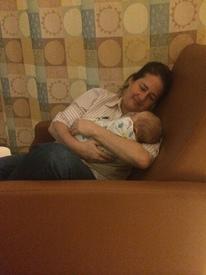That's It!!! I've had it!

IamUndrCnstruction
Posts: 691 Member
I am going to do it. I am going to up my calories to something at least close to what all the calculators out there say I should be eating to lose 1.5 a week. I am tired of being tired, of not feeling like I am putting everything into my workouts. Tired of freaking out whenever I eat something because it takes away from this arbitrary number on a screen. Yes, I am scared I might gain, because even a pound or two will cause issue with the transplant team. But....I am not losing really anyway....I have a month and a half to see if this will help or hurt. My work outs are getting consistently more intense, I need to fuel them as such. Thanks to those that have tried to ease my fears about this. Thanks for letting me put this out there!
0
Replies
-
You should do what you feel your body needs. Hope you work it out.0
-
I'm rooting for you.0
-
This is taking a long time for me but it IS making a difference Some days I am simply not hungry, but today, SO hungry and so, I am just going to eat. My shortcut to check if I am doing ok is to add my carbs and protein together at each meal and see if that total is less than my fat grams. It really keeps me on track. Good luck.0
-
annieboomboom wrote: »This is taking a long time for me but it IS making a difference Some days I am simply not hungry, but today, SO hungry and so, I am just going to eat. My shortcut to check if I am doing ok is to add my carbs and protein together at each meal and see if that total is less than my fat grams. It really keeps me on track. Good luck.
Yes! Some days I am not very hungry at all...and others, well... Don't get between me and my hamburger! So, going to watch the carbs, cause I have been creepin..but add 300 cal to my daily total, to see if that helps.
0 -
Hang in there and good luck! Let us know how you're doing with your upped calories!0
-
I am still not sure this is a good idea. I am no longer going to log exercise calories and just eat the daily allowance regardless of burn. That's how it works, right?0
-
IamUndrCnstruction wrote: »I am still not sure this is a good idea. I am no longer going to log exercise calories and just eat the daily allowance regardless of burn. That's how it works, right?
That's what I do, I never log my exercise (sometimes my activity tracker does though). When I upped my calories to 1400 from 1200 I didn't feel the need to eat back exercise calories anymore. But some people like to eat some back on their heavy exercise days.0 -
IamUndrCnstruction wrote: »I am still not sure this is a good idea. I am no longer going to log exercise calories and just eat the daily allowance regardless of burn. That's how it works, right?
Only if you calculate your calories based on your total daily energy expenditure (TDEE). If you're consistently working out, then you can set your calories based on your TDEE (set your activity level in MFP) and not log your exercise.0 -
But I thought you set your activity level without consideration for formal exercise? See...this is where I get confused. I do get at least 5-6 sometimes 7 hours of exercise a week, consistently.0
-
I set mine goal at betwen 15-20% of my 30 day avg TDEE (gives some leeway).
My goal is set at 1700 calories.
Some days I don't even come close to that (movie marathon on the sofa yesterday) so I just make sure to eat my BMR (1400 ish). Other days, I eat the 1700 and then some.0 -
Another thought to consider on the not really losing part...are you doing too much and putting your body under severe stress because of that?0
-
@sljohnson1207 that could very well be the case0
-
IamUndrCnstruction wrote: »But I thought you set your activity level without consideration for formal exercise? See...this is where I get confused. I do get at least 5-6 sometimes 7 hours of exercise a week, consistently.
You can do it either way, just as long as you don't double-count it.
I agree with @sljohnson1207, I think you're overdoing the exercise, especially if that's intense exercise. And if it's intense exercise, then not fueling your body sufficiently is going to make things even worse.
Sarah Fragoso of Everyday Paleo has talked about her experience with exercise-induced adrenal fatigue. She talks a lot about it in both writing and podcast. It's well worth a listen and read:
http://everydaypaleo.com/paleo-talk-episode-20/
http://www.norcalsc.com/you-can-do-it-all-or-can-you/0 -
Hi everyone. I am new to this forum, new to LCHF eating, and very intrigued by the differences between men and women with this diet.
I am a Gastroenterologist, and have been working with a number of severely overweight patients using nutritional ketosis to help address their severe insulin resistance. It does seem, just like sljohnson mentioned above, that for some women on LCHF diets (<20-50g/d of carbs), too low carb, calorie, or protein can put your body in a starvation mode that really does begin to "preserve itself" by stopping normal hormonal production (thyroid, adrenal, sex hormones, etc).
I am, in no way, an expert on this issue. However, if you are stuck in a rut, loosening your carb and calorie restriction, lightening up on energy expenditure, and ensuring you are resting would all be good starts.
For the forum, I would very much be interested in your experiences with this (especially the women) so your anectodal experiences can be helpful with my practice.0 -
Welcome, doc! Just curious -- why would it be a bigger problem for women than men? Would a saliva cortisol test be useful to monitor during the diet?0
-
@mpantsari ---Whoa! A doctor who wants to LISTEN and help? Sir, you are rare. Never met one before....0
-
Also rooting for you Iam.0
-
Probably the best anecdotal evidence we have here are all the people who say they started losing weight when they raised their calorie intake. That should lower cortisol. Not many people seem willing to raise their carb intake, but that should help too. As well as taking it easy on intense exercise (where "intense" seems to be a HR > 130 or so).0
-
I increased my calories by 200/day last week, and have lost more this week than I did in the 4 weeks before!Probably the best anecdotal evidence we have here are all the people who say they started losing weight when they raised their calorie intake. That should lower cortisol. Not many people seem willing to raise their carb intake, but that should help too. As well as taking it easy on intense exercise (where "intense" seems to be a HR > 130 or so).
0 -
I've upped mine to 1500 yesterday and am not going to eat exercise calories, I haven't lost for 3 weeks0
-
Probably the best anecdotal evidence we have here are all the people who say they started losing weight when they raised their calorie intake. That should lower cortisol. Not many people seem willing to raise their carb intake, but that should help too. As well as taking it easy on intense exercise (where "intense" seems to be a HR > 130 or so).
Could you explain how raising calorie and carb intake would lower cortisol? I suspect my cortisol is out of whack (sleep issues) but I don't understand much about it, or how to fix it. Thanks.0 -
sweetteadrinker2 wrote: »IamUndrCnstruction wrote: »I am still not sure this is a good idea. I am no longer going to log exercise calories and just eat the daily allowance regardless of burn. That's how it works, right?
That's what I do, I never log my exercise (sometimes my activity tracker does though). When I upped my calories to 1400 from 1200 I didn't feel the need to eat back exercise calories anymore. But some people like to eat some back on their heavy exercise days.
The last two weeks have been my fastest weight loss ever -- 7 pounds in two weeks. This despite the fact that i am much more relaxed about calories now that i have my carbs consistently under 30 a day. I generally try to stay under 1400, but if i am genuinely hungry, i eat something. I do between 60 and 120 minutes of exercise 6 days a week, but dont add my exercise into MFP (i use everymove).
0 -
wheatlessgirl66 wrote: »Probably the best anecdotal evidence we have here are all the people who say they started losing weight when they raised their calorie intake. That should lower cortisol. Not many people seem willing to raise their carb intake, but that should help too. As well as taking it easy on intense exercise (where "intense" seems to be a HR > 130 or so).
Could you explain how raising calorie and carb intake would lower cortisol? I suspect my cortisol is out of whack (sleep issues) but I don't understand much about it, or how to fix it. Thanks.
Cortisol is a stress hormone. Exercise is a stress. Starvation is a stress. Both low-calorie and low-carb look a lot like starvation to the body. And it's not just a stress hormone -- in all of these specific "stressors," it signals the liver that we need more sugar. That triggers gluconeogenesis to break down protein (ideally, protein we ate) to sugar.
A professor of biochem posted in the keto group here:
http://community.myfitnesspal.com/en/discussion/10116313/sleeping-issues-and-keto#latest
Look for the posts by @Katherineanewlon.0 -
wheatlessgirl66 wrote: »Probably the best anecdotal evidence we have here are all the people who say they started losing weight when they raised their calorie intake. That should lower cortisol. Not many people seem willing to raise their carb intake, but that should help too. As well as taking it easy on intense exercise (where "intense" seems to be a HR > 130 or so).
Could you explain how raising calorie and carb intake would lower cortisol? I suspect my cortisol is out of whack (sleep issues) but I don't understand much about it, or how to fix it. Thanks.
Calorie restriction adds stress to the body. The more you restrict, the more stress you put on it. This is a big reason why people who eat at large deficits commonly stall out, especially if they're not hundreds of pounds overweight.
Likewise, carb restriction can also add stress to the body, especially in the initial conversion and exercise adaptation periods.
Combine the two and you often end up on a path to burnout. This is why it's encouraged to not restrict calories in the initial couple of weeks to a month of switching to keto. One stress root at a time, basically.Not many people seem willing to raise their carb intake, but that should help too.
That's because a lot of us are between a rock and a hard place on that matter. On the low carb end, we have the potential cortisol issues. On the higher carb end, we have the issues with the insulin resistance, and our bodies don't do well on higher levels of carbs (either via straight weight gain or lack of loss, elevated insulin/blood sugar, or hunger/craving issues beyond normal signals).
Personally, I find it easier to manage cortisol with some Phosphatidyl Serine and manage the insulin resistance through diet than I do trying to balance both (assuming any cortisol issues are from diet, I have too many confounding issues to know for sure whether that's the case), or consuming enough carbs to keep cortisol down while trying to medicate the insulin resistance away (which I already know from experience no longer works).For the forum, I would very much be interested in your experiences with this (especially the women) so your anectodal experiences can be helpful with my practice.
I have poly-cystic ovarian syndrome (PCOS), so while my cortisol has recently been running a little high as far as I can tell (doctor only ran a dexamethasone suppression test, which came back normal), there's not really any way of knowing right now what the root cause of it is. It could be the PCOS, it could be my way of eating, it could be something else entirely. Unfortunately, the medical community as a whole has failed me at pretty much every turn (I'm at two months of waiting to even schedule an appointment with an endocrinologist, because there's a shortage in my area, and going off only the notes my GP sent in, I'm apparently not "bad enough" to warrant their time or attention, so....yeah...).
That said, I've found that I actually start seeing signs of being able to lose weight when I keep my carbs low, my fat high, and my protein moderate (I neither go out of my way to avoid or include protein). I'm currently toying with "zero" carb (or more accurately, zero plant or carnivore), and for once, I don't fight sugar cravings. I saw a larger drop in scale weight in three days than I have in months, regardless of diet (that even includes the water weight gain/loss from Easter, which still left me a couple pounds up more than a week later from my weight immediately before Easter, until I "broke through" that with ZC).
Since my cortisol does seem to run a little high (as indicated by how my resting heartbeat feels, my resting heart rate according to my Fitbit, and my ability to handle stress), I take 300mg of Phosphatidyl Serine, a supplement derived from soy or sunflowers (I use the sunflower version, since I try to avoid soy), which keeps the cortisol down. Like I said, though, I don't really have any way of knowing what the actual root cause of that is, because I have zero medical help on the cortisol front. The only way I have to tell is to increase carbs to some relatively arbitrary amount, stop the PS, and see if things change, then maybe reduce my carbs to see again if things change.
However, the weight loss, for me, is the most important part, because the insulin resistance and weight go hand in hand (and further adds to the cortisol puzzle -- my insulin has been increasing over the past several years, save for the short times where I was able to stave off that increase with Metformin (which has since appeared to stop working), so it could be the insulin itself causing the increase cortisol, either directly, or indirectly through its influence on the rest of the endocrine system), especially since I can control the cortisol with a supplement. After I've gotten down to a healthy weight, I can reassess the potential dietary link to my cortisol levels and experiment with increasing carbs (since I've got the maintenance thing down pat, it seems), and experiment with tweaking things to keep cortisol down through diet at a time when I should be more sensitive to carbohydrates.0 -
Thanks for the great discussion. I had trouble sleeping the first few weeks of going low-carb which I understand is related to cortisol induced by stress. I found almond butter before bed helped. I eventually adjusted and am now sleeping well w/out taking anything.
0 -
Thanks for the great discussion. I had trouble sleeping the first few weeks of going low-carb which I understand is related to cortisol induced by stress. I found almond butter before bed helped. I eventually adjusted and am now sleeping well w/out taking anything.
Sleep issues can also be from sodium deficiency. The almond butter may have been giving you the sodium needed to at least help with the sleep problem (even if it didn't have salt added, it still has a little sodium, which may have been the difference between sleeping and not).0 -
Welcome, doc! Just curious -- why would it be a bigger problem for women than men? Would a saliva cortisol test be useful to monitor during the diet?
I'm not sure I have the answer to this question. I have seen a number of men simply drop carbs, add fat, moderate protein, and drop weight. I have seen (or heard) of many women who drop carbs to similar levels, and really struggle. I am aware that leptin levels (which drop as insulin drops) can signficantly affect sex hormone levels and affect menstrual cycles.
I could hypothesize that the female body remains "ready" to support a growing child, and when the internal environment is threatened or "not right for conception" via a significant alteration in nutritional conditions, things run "amuck."
Obviously, that is just a hypothesis. But I would guess for any of us, but our body under enough stress (emotional, sleep deprivation, athletic triad, severe caloric deprivation) and our nutritional goals will suffer. I think we can go too far... too quickly...0 -
Welcome, doc! Just curious -- why would it be a bigger problem for women than men? Would a saliva cortisol test be useful to monitor during the diet?
I'm not sure I have the answer to this question. I have seen a number of men simply drop carbs, add fat, moderate protein, and drop weight. I have seen (or heard) of many women who drop carbs to similar levels, and really struggle. I am aware that leptin levels (which drop as insulin drops) can signficantly affect sex hormone levels and affect menstrual cycles.
I could hypothesize that the female body remains "ready" to support a growing child, and when the internal environment is threatened or "not right for conception" via a significant alteration in nutritional conditions, things run "amuck."
Obviously, that is just a hypothesis. But I would guess for any of us, but our body under enough stress (emotional, sleep deprivation, athletic triad, severe caloric deprivation) and our nutritional goals will suffer. I think we can go too far... too quickly...
It seems to be 50/50 for women, though the patterns I've seen suggest that it's the lower-weight women that tend to have more problems (men seem to, too, though in smaller proportions) than their overweight/metabolically damaged counterparts, especially when you start seeing the cases where very low carb cured amenorrhea in some women. You might be interested in the xxketo group on Reddit for that front.
It seems "nature's Rubix cube" goes deeper than just the external parts. 0
0 -
Anecdotal evidence: my entire family has been on lc at some point for some time. The women of childbearing age have significant trouble losing weight compared to the men at the same carb levels. We are also a very fertile family, birth control is about 50% effective. On birth Control we lose more easily, off of it? Screw that.0
-
Cortisol is a stress hormone. Exercise is a stress. Starvation is a stress. Both low-calorie and low-carb look a lot like starvation to the body. And it's not just a stress hormone -- in all of these specific "stressors," it signals the liver that we need more sugar. That triggers gluconeogenesis to break down protein (ideally, protein we ate) to sugar.
A professor of biochem posted in the keto group here:
http://community.myfitnesspal.com/en/discussion/10116313/sleeping-issues-and-keto#latest
Look for the posts by @Katherineanewlon.
@Wabmester Thank you; that helps me understand cortisol a little better. I also read the posts and found them very helpful.
@Dragonwolf Thanks! I think I'm caught between cortisol and insulin resistance, too. Getting it right seems pretty difficult. Sometimes the information makes my head spin...0
This discussion has been closed.












